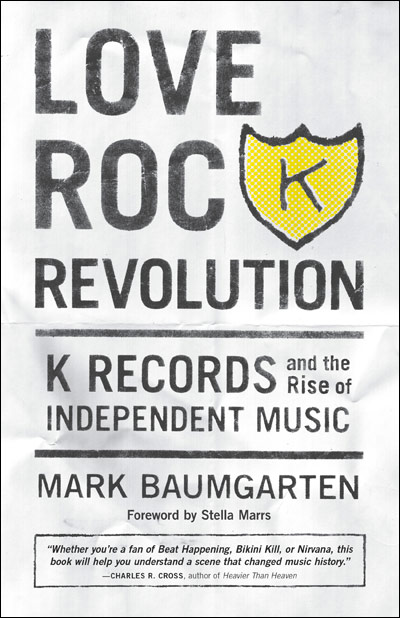
K Records and the Rise of Independent Music
by Mark Baumgarten
Sasquatch
Olympia, the small city that serves as the capital of Washington state, is not the first place that comes to mind when one considers punk epicenters. But since the early ’80s, it has been the homebase of K Records, the label run by Calvin Johnson that has always epitomized the punk ethos of art over commerce and strength in doing it yourself. Johnson has also always endorsed a heightened idea of localism, whereby a scene could spring up in any town, not just in entertainment capitals like New York and Los Angeles, and that’s exactly what he helped foster in Olympia.
Mark Baumgarten’s new book, Love Rock Revolution, tells the story of how Johnson went from a teenager fascinated by the punk scenes of London and New York to fronting bands like Beat Happening and running the small but influential label. As the book’s subtitle denotes, this story is indelibly intertwined with the development of the Pacific Northwest as center of the rock music universe and the rise of independent music in the ’90s. K and Sub Pop both sprang from the clique that revolved around Evergreen State College’s radio station, KAOS, and K’s fortunes might have different if Johnson hadn’t passed on Nirvana after hearing the band’s demo. As it is, the label has released records by artists like Beck, Built to Spill, Modest Mouse, who went on to fame and fortune.
Of course, as the book makes clear, Johnson has never made money a priority. Since beginning the imprint releasing cassettes, his goals have always been modest and he has always prized nurturing a creative environment over profit. Baumgarten, who was the music editor at Portland alt-weekly Willamette Week and is now an editor at Seattle’s City Arts, does a commendable job of tracing K’s trajectory as it developed and crossed paths with Ian MacKaye and Dischord Records, Bikini Kill and the riot grrl movement, Slim Moon and his Kill Rock Stars imprint, The Pastels, The Vaselines, and countless others. Less insightful are his sidebar asides featured in the first half of the book. I have to imagine that anyone interested in K Records hardly needs “A Brief History of Hardcore” or“ A Brief History of Punk Politics.” These pages could have been better utilized with some photographic documentation, which is notably absent from the book. Surely someone in Olympia had a camera and the wherewithal to use it.
Nevertheless, K’s story is a fascinating one and Baumgarten tells it admirably. The book also comes with a download code for a 21-track compilation that traverses the label’s discography from Beat Happening to Mirah. Johnson and K created something very special, nurturing Olympia and Evergreen as much as they in turn nurtured them. It’s probably an overstatement to say that the world of independent music wouldn’t be the same without K, but it surely would be quite a bit less interesting. Thankfully that’s not the case.
Stephen Slaybaugh
Great Plains, Directions to the Party
My Morning Jacket Live Review
The Zombies and The Left Banke Live Review
King Khan and the Shrines Live Review
DJ Brad Hales
The English Beat Live Review
El-P Live Review
July Festival Guide
Northside Festival and Destroyer and Wintersleep Live Reviews
The Clean and The Cult Live Reviews
George Harrison: Living in the Material World
June Festival Guide
Ty Segall, Nelsonville Music Festival, and Paul Weller Live Reviews
Marley
